
Discover more from Fr. Joe’s Newsletter - Moving to Russia
The Gleason Family's First Seven Years in Russia - Interview at Stretensky Monastery in Moscow
Fr. Joseph Gleason lives and serves as a priest in Russia with his large family. Seven years ago, he, his wife, and eight children moved from America to the rural Russian countryside
– Father Joseph, please tell us about yourself. Where are you from? How did you become an Orthodox priest?
– I was born in America and raised Protestant. Of course, I was taught to believe in Christ and read the Bible. But there were no priests or bishops in our denomination. As an adult, I became a Protestant pastor and continued to study the Holy Scriptures. I also studied Church history. And gradually changes began in my worldview: the more I read the Bible and church history, the more convinced I became that my wife and I should have our young children baptized. Even as a Protestant, I believed that the Church should have bishops, priests, and deacons, as in the Anglican Church, for example. And we converted to Anglicanism. I also believed that even small children of two or three years old should receive communion. This is not usually accepted in Protestantism. Even if they baptize infants, they usually wait until the children are seven years old, or even older, to give them First Communion.
I continued to study the Holy Scriptures and eventually discovered that the Orthodox Church has all this: they baptize infants, there are bishops and priests, and Holy Communion is given to infants. All of this interested me very much, I wanted to learn more about Orthodoxy. And I thought: "What was there before Protestantism? Was it only the Roman Catholic Church? No." I learned about Greek and Russian Orthodoxy and wondered what it was really like. After all, it is different from Catholicism. I began to think: "What did the holy apostles believe in? When we read something about the Early Church, does it look Protestant? Is it similar to modern Roman Catholicism?" I discovered that if you read early Christian texts within the first few centuries from the birth of Christ, then this is already the Orthodox Christian Faith. And the modern Orthodox Church has not changed its tradition and faith since then.
Sadly, though Roman Catholics were formerly Orthodox during the first millennium, they later changed their doctrines and gave an inappropriate amount of power to the Pope. They began to change doctrines, they stopped giving Communion to small children, and over time they changed a lot.
The Protestants changed all this even more. And so, studying all this, I finally came to the conclusion that I want to become part of the very Church that Jesus Christ and His Apostles created, I must become Orthodox.
At the time when I became Orthodox, I had been a Protestant pastor. My small parish also converted to Orthodoxy. I was advised to take Orthodox seminary courses, which I completed. A few years later I was ordained a deacon. In 2014, my bishop ordained me to the priesthood. Later, I completed a Master of Theology program remotely at the Balamand Theological School located in Lebanon. At that time, my family and community belonged to the Antiochian Archdiocese of North America.
– If we compare the Patriarchate of Antioch and the Russian Patriarchate, where you currently serve, where is it better to serve?
- It's hard to say. After all, the Orthodox Faith is one. In Orthodox churches all over the world, be they Russian, Serbian, Antiochian, Greek, or Georgian, the same teaching must be preached. But there are some differences in organizational nuances, and somewhere it is better in one, somewhere in another. The most important thing is that everywhere, all over the world, in Orthodox churches they teach the same Orthodox Faith.
– How did it happen that you now live in Russia?
– In 2015, the Supreme Court of the United States of America upheld the "right" of all states to recognize same-sex "marriages". Of course, the acceptance of homosexual behavior is the primary reason why Sodom and Gomorrah were destroyed by God. I believe that the foundation of any society and any nation is based on what people think about God, what they believe in, and how they feel about the institution of family. If these fundamental values — faith in God and family — are destroyed, then the whole country will come to destruction. I think that either America will repent of this monstrous sin, this idea of same-sex marriage, which destroys the family, or this country will be destroyed. In Russia, work is being carried out at the official level against the idea of same-sex marriage, and certain measures are being taken against this.
Russia is not perfect; there are many problems here. But I think, thanks to the attitude of the Russians to this particular issue, God especially cares about Russia, because Russians defend the truth. I want my children to live in this country, and not in a place where a man can "marry" another man, which, generally speaking, is simply absurd.
– Please tell us what your initial stay in Russia was like?
- Oh, it was wonderful to meet so many good Orthodox people! The only problem was the Russian language, since I had to go everywhere with a translator. But, you know, I felt that these people and I belonged to one big family. When I communicated with Orthodox Christians in Russia, I felt that, despite our differences, despite the fact that we came from another country and speak a different language, we form one family with them. Of course, I still need to learn the language better, but otherwise I really like it here. Two difficult issues in Russia are the bureaucracy (with immigration) and the roads. But there are many wonderful people here, and I love the Russian Orthodox Church.
– Where do you live and serve now? Tell us about your arrival.
– We live in a tiny village not too far from Yaroslavl. And not very far from there there is a small village with the church of the Holy Theophany. I have been serving there for several years now. Among my parishioners, of course, are my wife and eight children, babushkas (grandmas), and local families.
Also in the area are several American families, as well as people from Switzerland, Denmark, and Canada. Some of them have already bought a house, others are renting. In America, the situation now is that if you are against same-sex marriage, then you can have difficulty getting into college, getting a job, and the situation is getting worse. These families came here for many of the same reasons we did.
– It turns out that you have a community of foreigners there.
- Yes. But there are so many churches in the Golden Ring of Russia! And some foreigners who come attend churches located near their home, or they go to the monastery in Borisoglebsky.
– How does your family live? What are your children doing?
– We have a house and more than 50 hectares of land. I have a tractor, cows, goats, chickens, geese, pigs, a large garden and a vegetable garden. We are cultivating part of the land, and I also want to buy more cows. One of my daughters makes homemade cheese for our large family.
My children are homeschooled. We brought curriculum and textbooks from America. And in order to learn the Russian language, the children studied with a bilingual Russian Orthodox nun from one of the nearby monasteries. They visited her for lessons multiple times a week. They like it in Russia. They now speak Russian well. They enjoy caring for the animals on our farm.
They love the Russian Orthodox Church. My daughters sing in the choir, and my sons are altar servers. When we moved, my youngest son was only eight months old; now he is seven years old and helps in the altar. My oldest daughters are 20-year-old twins. All the children still live in our house with their mother and me. Our children read a lot. We have a large amount of spiritual literature, and they constantly read the Synaxarion, the Holy Scriptures, and all sorts of good books. Some of them play the piano, one daughter plays the guitar, and two of my sons love chess. All the children, of course, help in caring for our animals.
You know, for thousands of years people lived on Earth without televisions, phones, and the Internet... Yes, sometimes we watch a good, clean film with the whole family. I'm not against the Internet, but, you see, most of the content on the Internet is just garbage. Not too long ago, we watched an animated film about a holy Grand Prince and his bride, Saints Peter and Fevronia of Murom. We like these kinds of films.
I believe that living outdoors, homeschooling children, and having a small farm are all very good things. But most importantly, life must be Christ-centered.
– Which saints are especially revered by your family?
– Our most beloved saint is St. Benedict of Nursia. We are inspired by his life, and we love the Rule of St. Benedict. We even have a small relic of this saint in our family prayer corner. He means a lot to us.
Another beloved saint is St. Nicholai Velimirovic. Every day when we gather as a family for breakfast, we read excerpts from his writings, especially the Prologue of Orhid.
We love St. Nicholas the Wonderworker, St. Seraphim of Sarov, and St. Seraphim of Vyritsky, as well as the venerable elders of Optina, Saints Peter and Fevronia of Murom, St. Dmitry of Rostov, St. John the Merciful (of Rostov), and St. Peter of Rostov. Oh, we have many favorite saints!
– Can you remember the holy places that you visited and which particularly stood out to you?
- Yes. During the first months of our stay in Russia, I was diagnosed with cancer. I needed surgery and chemotherapy, and it was hard. I felt so bad. I had surgery and needed to recover from it before starting chemotherapy. Then I took my two sons and we went to Mount Athos to the Vatopedi monastery. There is the original of the miraculous icon of the Mother of God “The Pantanassa”. This is a several hundred year old icon. I knew that many people prayed in front of this icon and were healed of cancer. So I decided to go there with my boys. There we fervently prayed to the Mother of God.
We returned to Moscow. I had previously heard that in one of the thousand-plus churches in Moscow there is a copy of this icon, and hundreds of people also come to it and are healed. I only heard about it, but didn't know where it was. On Saturday, as I remember, we returned from Mt. Athos and checked into some hotel in Moscow. The next morning, Sunday, I woke up and didn’t know where we should go for the liturgy. I looked out the window of the room, saw some golden domes and said to my sons, “Let's go there.” We went and discovered that this was not just a church, but a big beautiful monastery!
And what’s surprising is that when we entered there, I met my American acquaintances. They happily came up to me. “Hello! What are you doing here?"
It turned out that it was the Alekseevsky Convent, where Archpriest Artemy Vladimirov, such a wonderful, kind priest, serves. He invited me to the altar to serve him. After the liturgy, I left the altar to talk with an American friend of mine, a parishioner of this church. I began to tell him that I had just returned from Mt. Athos, where I prayed at the miraculous Pantanassa icon. I mentioned that somewhere in Moscow there is a church with a copy of the same image, where hundreds of people come to the same icon and pray for healing. Suddenly, I clearly felt that this icon had to be in this church... And my friend said, “Here it is!” I turned and saw it right there.
I realized that it was a miracle! The Mother of God Herself called me to this church. After all, before this happened, I did not know that this icon was here. I was amazed. Of course, I venerated the icon, prayed, and picked up some holy oil that had been blessed by the icon. I continued chemotherapy and kept praying. I kept a copy of this particular icon, and anointed myself with the holy oil.
After all the courses of treatment, the doctors are not able to find any trace of cancer in me. Now, more than six years after the discovery of the disease, they still aren't able to find anything. I thank the Most Holy Theotokos for her prayers, and I thank the Lord Jesus Christ for my healing!
– What you said is amazing. What other holy places have you been to? Have you met holy people in your life? Did you see Elder Ephraim of Arizona when you lived in America?
- No, I didn’t see him. But in Platina, California, I visited the monastery where St. Seraphim (Rose) lived. I got to go into his monastic cell, and it was extraordinary. Did you know that he has already been officially recognized as a saint by a bishop in the Georgian Church? And in Moscow there is a church where he has already been depicted on a fresco. I feel that he is somehow close to me. And when I visited his monastery in Platina, it was a special event.
Of course, I also made a pilgrimage to the cathedral in San Francisco, where the holy relics of St. John Maximovich rest. Perhaps you have heard about Abbot Damascene from Platina? He wrote a biography of Seraphim Rose. I got to meet him. He gave me a piece of Father Seraphim's phelonion. For me, this is a precious treasure.
Another interesting point. St. Paisios of the Holy Mountain lived at one time on Mount Sinai in Egypt, then moved to Athos. When we were on Mount Athos, my sons and I saw the cell where he lived. A few years later, my two daughters and I went to Sinai. We stayed at St. Catherine's Monastery for a week. One day we just went exploring the area and came across a cave that looked like a monastic cell. It had belonged to St. Paisios when he labored there. There was a meeting with him again, but in a completely different country. The saints communicate with us in this way.
– Let's return to your life in Russia. How do you find modern Russian believers?
– Both in America and in Russia I saw the same picture. Both there and here there are people who do not think about God at all. In America, in the Orthodox Church, there are some people who only come to church on Pascha (Easter) and Christmas. There are some who come every Sunday. And there are some who really take their faith seriously, who pray daily at home, observe fasts, and frequently take communion.
In Russia, in the Orthodox Church, we see the same thing here. There are many nominally Orthodox people, who almost never go to church. There are some who come to services every Sunday. And there are some who take their faith seriously, frequently attend divine services, read the Holy Scriptures, read the lives of saints, and try to show obedience to what is said in the Gospel.
In this sense, I think the situation is the same as in Greece. Yes, there are many baptized people in this country, but here we see the whole spectrum of people: from atheists to extremely strict Orthodox Christians. And, of course, there are many people in between. Therefore, when I meet a new person, I first try to understand how serious his faith is.
– Is there anything special that you would like to say to Russian believers?
- Yes. There are words that I would like to say not only to Russians, but also to Americans, as well as to any Orthodox believers.
It is important to realize that not everything that bishops or individual priests teach from the pulpit is undoubtedly Orthodox. Even if a bishop allows something or a priest forbids something, we ourselves must thoughtfully read the Holy Scriptures, the lives of saints, and the writings of the holy fathers. Don't think that you automatically become "Orthodox" just because you follow what your bishop or priest says. You will acquire the Orthodox spirit if you follow what the holy fathers (the saints) teach. We all need to become one hundred percent Orthodox, and not half.
– But if a person understands that he has weak faith, that he is only half Orthodox, as you say, how can he strengthen his faith to one hundred percent?
– The Scripture says: “Faith comes by hearing, and hearing by the word of God” (Rom. 10:17). If someone has a small amount of faith, but wants more, such a person needs to devote more time every day to reading the Holy Scriptures, the writings of the holy fathers, and lives of the saints. And the more a person reads these books every day with a humble, open, childlike heart, the more his faith will grow.
– In the modern world, including in Russia, there are now many people who feel lost and are confused by what is happening around them. How can Christians help such people, lead them to faith, and give them hope?
– To begin with, we must have strong faith ourselves. Even if we go to church on Sundays, but the rest of the time if we just watch TV, and we waste both time and money on things that are unrighteous; if we don’t pray daily with our family; if we do not know what is written in the Holy Scriptures; If we ourselves do not believe properly, then how can we help others? The first step in helping others must start with ourselves. Do I start every day with prayer in front of the holy icon corner? Do I pray before going to bed? Do I read the Bible and the Holy Fathers? Do I attend church on Sundays and holy feast days? Do I fast? When a person himself is established in faith, he will be able to convey the good news to others.
However, even if you have the best Orthodox books, if people look at your life and see that you are not living in accordance with what you say, they will think: “Why should I listen to you? After all, you yourself don’t believe. You are a Pharisee.” But if you speak from your heart and live by your words, people will see your true faith. And then, perhaps, they themselves will believe and find peace.
We must first rebuild ourselves, our lives. St. Seraphim of Sarov said that if you find inner peace (in Christ), then thousands around you will be saved. If we don’t live like the people around us, like atheists, as if there is no God, but strive with all our might to do what I said above, do you know what will happen? A new way of life will change us, and the Holy Spirit will dwell in us, and give us the strength and necessary words to support our neighbors. And then we will come up to people, look into their eyes, and they will see that we really believe that Christ came to earth and died for everyone on the Cross. And then we can convey to others the good news of hope that Christ has truly risen.
Interviewed by Alexandra Kalinovskaya
Priest Joseph Gleason
December 19, 2023
Originally appeared at: monastery.ru (Russian)

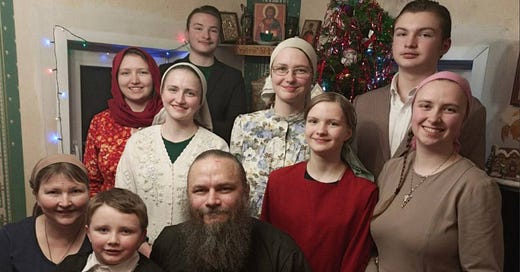



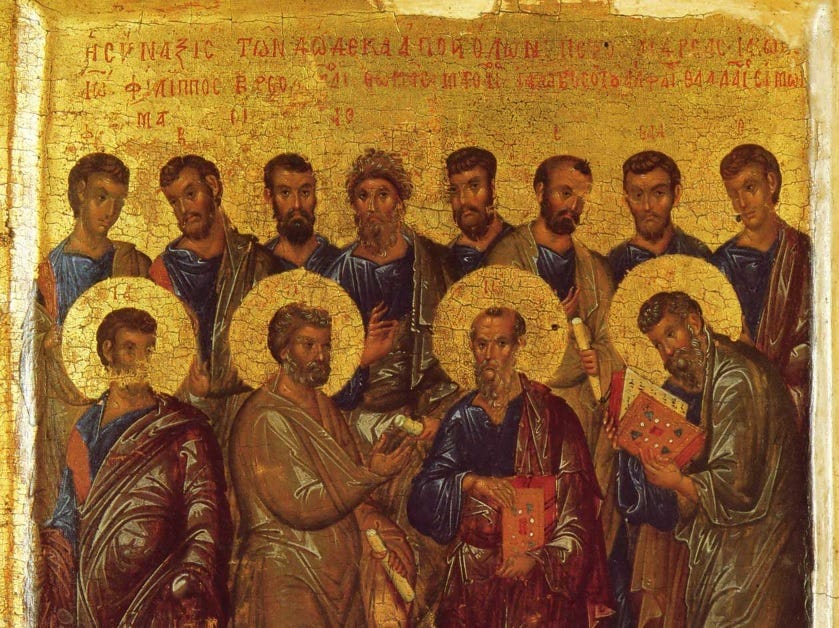
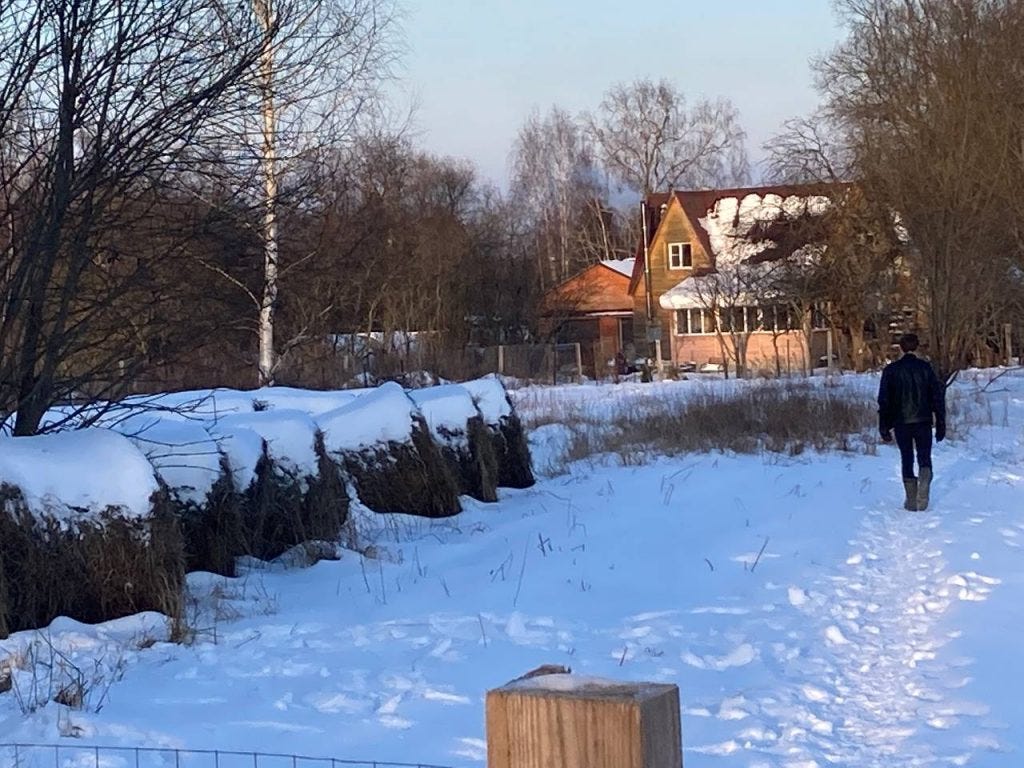
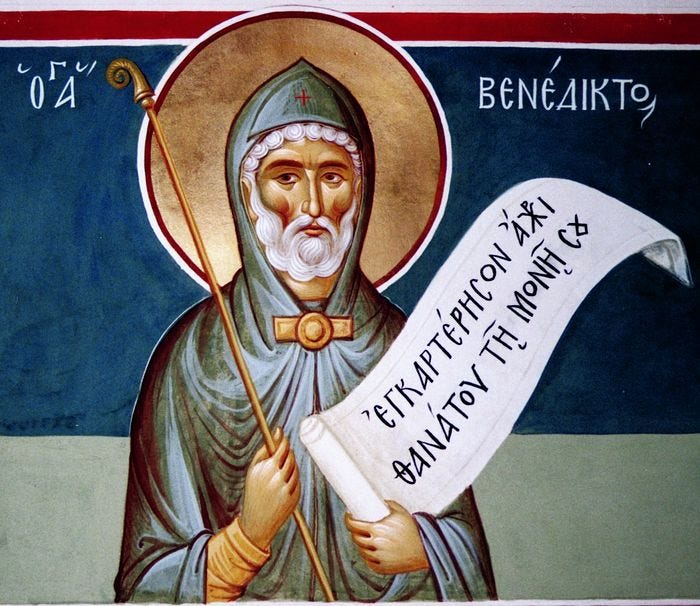
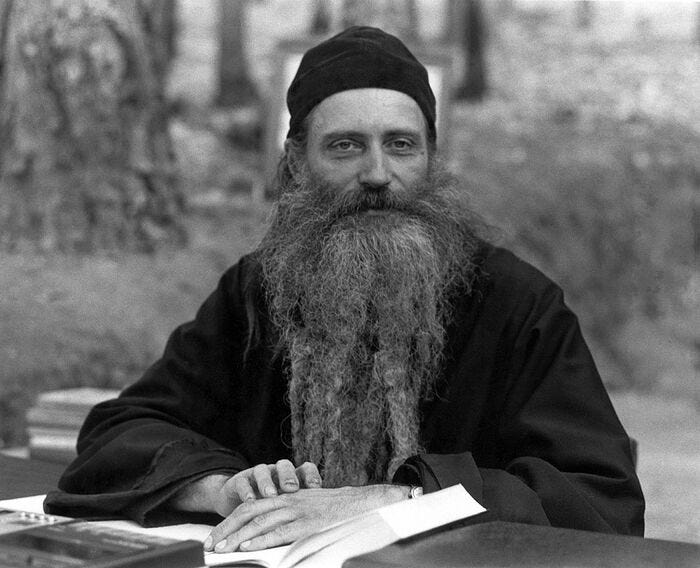
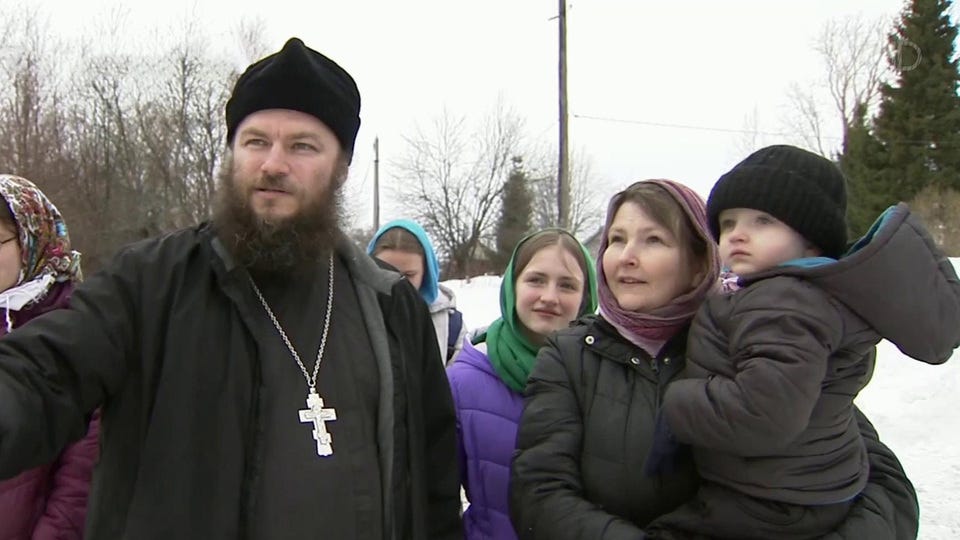





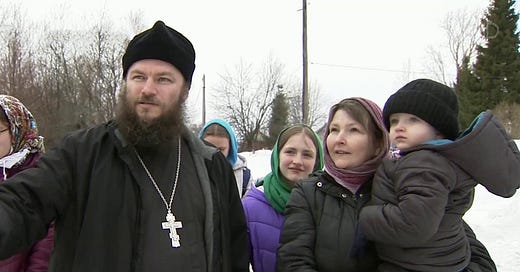





I recently became a subscriber and I am enjoying your content. I also have substack focused on investing in real estate overseas. I saw a post you did in 2022 about Homes in Rostov. I'm working on a post about the Russian real estate market for foreign investors. Has the recent friendly countries list impacted the ability for Americans to buy in Russia? And do you have a good real estate agent or lawyer that speaks english I can get in contact with? Thanks G-d bless!
Hello Father Joseph,
It was so interesting to read your interview!
Vadim from Bellevue, WA is a friend of ours and put us in touch by email.
Tatyana and I have been married for 15+ years and moved to Yekaterinburg just recently. We were married in the Pokrov Church in Seattle and I too was a Protestant. I also love the Russian Orthodox Church! It’s the way Jesus wanted a church to be. It’s so right to have a service full of worship!
Can you tell me - which village do you live in? Is it near St Petersburg?
We’d like to meet you and your family someday in the near future.
God Bless from
Vladimir and Tatyana
C: +1-360-390-3040
Also on WhatsApp